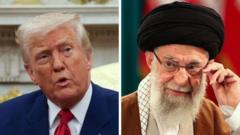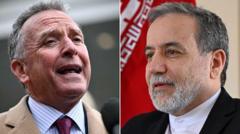Oman's recent announcement of a 5% income tax on high earners is being observed closely by other Gulf states, suggesting a shift towards economic diversification and reduced reliance on fossil fuels. This decision reflects broader trends in the region, where governments are exploring alternative revenue sources amidst fluctuating oil markets.
Oman's Historic Income Tax: A Potential Shift in Gulf Economic Policies

Oman's Historic Income Tax: A Potential Shift in Gulf Economic Policies
The introduction of a 5% income tax by Oman marks a significant turning point in the economic landscape of the Persian Gulf, prompting discussions on the future of oil-dependent economies.
Oman made headlines last week by announcing a groundbreaking 5% income tax, effective in 2028, targeting individuals earning more than 42,000 Omani riyals (approximately $109,000). This policy decision is viewed as a potential catalyst for change in the economic dynamics of the Persian Gulf, traditionally characterized by its heavy reliance on oil revenues.
Omani officials are framing the tax as a measure to enhance social equity and diminish the nation's dependence on oil and gas, which accounted for around 70% of state revenues last year. Analysts suggest Oman could serve as a model for fiscal reform in a region where monarchies have historically distributed oil wealth to maintain social stability while constraining political engagement.
The introduction of an income tax comes at a time when oil revenue volatility has heightened scrutiny of the longstanding fiscal management strategies employed by Gulf monarchies. These regimes have typically relied on public-sector employment and subsidies to maintain public support, while centralizing considerable wealth and political authority within royal families.
Countries like Saudi Arabia have already begun to rethink their economic strategies. Under Crown Prince Mohammed bin Salman, the kingdom has rolled back energy subsidies as part of a broader initiative to diversify the economy. Such reforms have not been without backlash; citizens rushed to fill their tanks in anticipation of price hikes, illustrating the public's sensitivity to shifts in government policy.
Oman's new tax law reflects a potential turning point, compelling other Gulf states to contemplate similar fiscal reforms in light of an uncertain oil future. If successful, Oman could pave the way for a redefined economic paradigm in the Gulf, balancing revenue generation with social equity in a region long dominated by authoritarian governance and resource wealth.






















